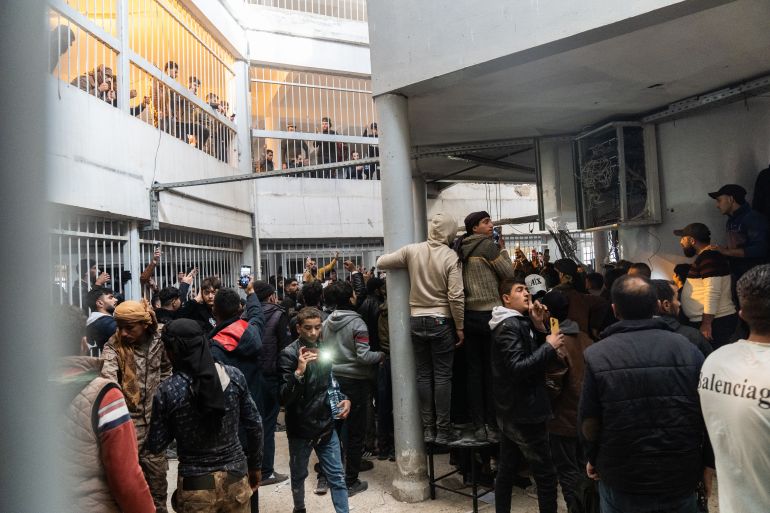Syria’s al-Sharaa promises to punish those who tortured, killed detainees
HTS leader seeks ‘justice’ for detainees as Syria’s new rulers attempt to stabilise the country after years of civilwar.
Some 100,000 Syrians are still unaccounted for, many of whom have been missing since the beginning of the civil war, rights groups say [Emin Sansar/Anadolu]Published On 11 Dec 202411 Dec 2024
The main commander of the Syrian fighters who toppled Bashar al-Assad has warned that anyone involved in the torture or killing of detainees during the deposed president’s rule would be hunted down and pardons were out of the question.
“We will pursue them in Syria, and we ask countries to hand over those who fled so we can achieve justice,” Hayat Tahrir al-Sham (HTS) leader Ahmed al-Sharaa, also known as Abu Mohammed al-Julani, said in a statement published on the Syrian state TV’s Telegram channel on Wednesday.
His comments came after thousands of detainees were released and families hoped to find others who disappeared in the country’s notorious jails, including the Sednaya Prison.
The world is carefully watching to see if Syria’s new rulers can stabilise the country after a 13-year civil war devastated the country.
Al-Sharaa, whose former al-Qaeda affiliate group is now the country’s most powerful force, must balance demands for justice from victims with the need to prevent violence and secure international aid.
Families continue to wait in and around Sednaya Prison, infamous for torture under toppled Bashar al-Assad’s regime in Damascus, Syria [Emin Sansar/Anadolu Agency]
The new interim prime minister said he aimed to bring back millions of Syrian refugees, create unity and provide basic services, but rebuilding would be daunting.
Advertisement
“We have no foreign currency and as for loans and bonds, we are still collecting data,” said Mohammed al-Bashir, who headed a HTS-led administration in Idlib before the lightning offensive swept into Damascus and toppled al-Assad over the weekend.
US officials in touch with rebels
Rebuilding Syria is a colossal task following a civil war that killed hundreds of thousands of people. Cities have been bombed to ruins, swaths of countryside depopulated and the economy gutted by international sanctions. Millions of refugees still live in camps after one of the biggest displacements of modern times.
US officials are warily engaging with the former opposition fighters, although HTS remains designated an international “terrorist” organisation by Washington, the United Nations, the EU and others.
The new government must “uphold clear commitments to fully respect the rights of minorities, facilitate the flow of humanitarian assistance to all in need, prevent Syria from being used as a base for terrorism or posing a threat to its neighbours,” Secretary of State Antony Blinken said in a statement.
Countries hope the new authorities’ behaviour will make it possible to ease the wartime sanctions imposed on Damascus under al-Assad, as well as the sanctions imposed on the rebels who toppled him.
The new government has told business leaders it will adopt a free-market model and integrate into the global financial system after decades of state control, according to the head of the Damascus Chambers of Commerce, Bassel Hamwi.
Advertisement
Mausoleum torched
Meanwhile, a resident of al-Assad’s family hometown of Qardaha said a group of opposition fighters had torched the mausoleum of al-Assad’s father Hafez over the past two days.
Russia, al-Assad’s close ally that has granted him asylum, warned about the prospect of a return of ISIL (ISIS), the group that established a violent mini-state in swaths of Syria and Iraq from 2014-2017.
For refugees, the prospect of returning home has brought a mixture of joy and grief over hardship in exile. Syrians lined up at the Turkish border on Wednesday to head home, speaking of their expectations for a better life.
“We have no one here. We are going back to Latakia, where we have family,” said Mustafa as he prepared to enter Syria with his wife and three sons at the Cilvegozu border gate in southern Turkiye. Dozens more Syrians were waiting to cross.
The rebels’ victory was a blow to Iran’s “Axis of Resistance” alliance of armed groups, which also includes Lebanon’s Hezbollah, groups in Iraq, and Yemen’s Houthis.
In a speech reported by state media, Iran’s Supreme Leader Ayatollah Ali Khamenei struck a defiant tone: “The more pressure you exert, the stronger the resistance becomes. The more crimes you commit, the more determined it becomes. The more you fight against it, the more it expands,” Khamenei said.
Israel moved quickly and carried out 480 attacks across the country in the past 48 hours, its military said. Strikes hit military installations and facilities, it said.
Advertisement
Israeli tanks also moved in the occupied Golan Heights in a bid to create a “buffer zone” along the Israeli-annexed area – a move that has been slammed by several nations, as well as the UN.
Al Jazeera’s Resul Serdar, reporting from Damascus, said the strikes posed a “huge” challenge for the new leaders.
Israel is “hitting the northern cities, the coastal cities of Tartous and Latakia, Homs, Hama and in and around the capital, Damascus”, Serdar said, adding that the new rulers are trying to “preserve the state apparatus, while also trying to provide security”.
